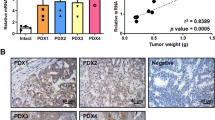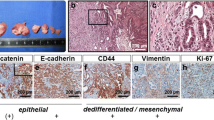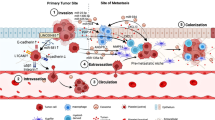Abstract
Purpose
To study the molecular mechanisms of colorectal cancer liver metastasis.
Methods
Cecal wall implantation was performed in nude mice to subclone a highly liver metastatic human colorectal cancer clone (SW1116-M) from SW1116. In vivo and in vitro assays were adopted to confirm the proliferation and metastasis potential. The human tumor metastasis PCR microarrays were used to analyze the differential gene expressions. The results were confirmed further by real-time quantitative PCR.
Results
SW1116-M and SW1116-S5, two human colon cancer cell clones with different metastatic potential, were subcloned from SW1116. In SW1116-M, in vitro invasion, migration and in vivo metastatic potential were higher, and in vitro proliferation rate was lower than SW1116-S5. In tumor metastasis PCR microarray, 24 genes related to cell invading, adhesion, cellular growth and differentiation were found with a twofold difference between SW1116-S5 and SW1116-M. Sixteen of these, including E-cadherins, MTSS1, TRAIL and TRPM1, were up-regulated; eight genes including cathepsin L, EphB2, HGF, MET, MCAM and RORβ were down-regulated.
Conclusions
We have established a highly liver metastatic clone. The subsequent metastasis PCR microarray analysis identified a procedure of cellular differentiation and mesenchymal to epithelial transition (MET) in liver metastasis. The colonization to from macrometastasis is not a switch from cell cycle arrest but a result of cell differentiation and MET.








Similar content being viewed by others

References
Abdalla EK, Hicks ME, Vauthey JN (2001) Portal vein embolization: rationale, technique and future prospects. Br J Surg 88:165–175
Anjomshoaa A, Nasri S, Humar B, McCall JL, Chatterjee A, Yoon HS, McNoe L, Black MA, Reeve AE (2009) Slow proliferation as a biological feature of colorectal cancer metastasis. Br J Cancer 101:822–828
Arakaki N, Kajihara T, Arakaki R, Ohnishi T, Kazi JA, Nakashima H, Daikuhara Y (1999) Involvement of oxidative stress in tumor cytotoxic activity of hepatocyte growth factor/scatter factor. J Biol Chem 274:13541–13546
Brew K, Nagase H (2010) The tissue inhibitors of metalloproteinases (TIMPs): an ancient family with structural and functional diversity. Biochim Biophys Acta 1803:55–71
Cunningham D, Humblet Y, Siena S, Khayat D, Bleiberg H, Santoro A, Bets D, Mueser M, Harstrick A, Verslype C, Chau I, Van Cutsem E (2004) Cetuximab monotherapy and cetuximab plus irinotecan in irinotecan-refractory metastatic colorectal cancer. N Engl J Med 351:337–345
Delektorskaya VV, Perevoshchikov AG, Golovkov DA, Kushlinskii NE (2005) Expression of E-cadherin, beta-catenin, and CD-44v6 cell adhesion molecules in primary tumors and metastases of colorectal adenocarcinoma. Bull Exp Biol Med 139(6):706–710
Deves C, Renck D, Garicochea B, da Silva VD, Giulianni Lopes T, Fillman H, Fillman L, Lunardini S, Basso LA, Santos DS, Batista EL Jr (2011) Analysis of select members of the E26 (ETS) transcription factors family in colorectal cancer. Virchows Arch 458(4):421–430
Dyer MJ, MacFarlane M, Cohen GM (2007) Barriers to effective TRAIL-targeted therapy of malignancy. J Clin Oncol 25(28):4505–4506
Foveau B, Leroy C, Ancot F, Deheuninck J, Ji Z, Fafeur V et al (2007) Amplification of apoptosis through sequential caspase cleavage of the MET tyrosine kinase receptor. Cell Death Differ 14:752–764
Ginos MA, Page GP, Michalowicz BS, Patel KJ, Volker SE, Pambuccian SE, Ondrey FG, Adams GL, Gaffney PM (2004) Identification of a gene expression signature associated with recurrent disease in squamous cell carcinoma of the head and neck. Cancer Res 64(1):55–63
Gocheva V, Joyce JA (2007) Cysteine cathepsins and the cutting edge of cancer invasion. Cell Cycle 6(1):60–64
Gocheva V, Zeng W, Ke D, Klimstra D, Reinheckel T, Peters C, Hanahan D, Joyce JA (2006) Distinct roles for cysteine cathepsin genes in multistage tumorigenesis. Genes Dev 20(5):543–556
Goulet B, Sansregret L, Leduy L, Bogyo M, Weber E, Chauhan SS, Nepveu A (2007) Increased expression and activity of nuclear cathepsin L in cancer cells suggests a novel mechanism of cell transformation. Mol Cancer Res 5(9):899–907
Han YC, Yu YP, Nelson J, Wu C, Wang H, Michalopoulos GK, Luo JH (2010) Interaction of integrin-linked kinase and miniature chromosome maintenance 7-mediating integrin {alpha}7 induced cell growth suppression. Cancer Res 70(11):4375–4384
Heinzle C, Gsur A, Hunjadi M, Erdem Z, Gauglhofer C, Stättner S, Karner J, Klimpfinger M, Wrba F, Reti A, Hegedus B, Baierl A, Grasl-Kraupp B, Holzmann K, Grusch M, Berger W, Marian B (2012) Differential effects of polymorphic alleles of FGF receptor 4 on colon cancer growth and metastasis. Cancer Res 72(22):5767–5777. doi:10.1158/0008-5472
Hezel AF, Deshpande V, Zimmerman SM, Contino G, Alagesan B, O’Dell MR, Rivera LB, Harper J, Lonning S, Brekken RA, Bardeesy N (2012) TGF-β and αvβ6 integrin act in a common pathway to suppress pancreatic cancer progression. Cancer Res 72(18):4840–4845
Hill A, McFarlane S, Mulligan K, Gillespie H, Draffin JE, Trimble A, Ouhtit A, Johnston PG, Harkin DP, McCormick D, Waugh DJ (2006) Cortactin underpins CD44-promoted invasion and adhesion of breast cancer cells to bone marrow endothelial cells. Oncogene 25(45):6079–6091
Jemal A, Siegel R, Ward E, Murray T, Xu J, Thun MJ (2007) Cancer statistics. CA Cancer J Clin 57:43–66
Kartenbeck J, Haselmann U, Gassler N (2005) Synthesis of junctional proteins in metastasizing colon cancer cells. Eur J Cell Biol 84:417–430
Kessenbrock K, Plaks V, Werb Z (2010) Matrix metalloproteinases: regulators of the tumor microenvironment. Cell 141:52–67
Klein CA, Blankenstein TJ, Schmidt-Kittler O, Petronio M, Polzer B, Stoecklein NH, Riethmüller G (2002) Genetic heterogeneity of single disseminated tumour cells in minimal residual cancer. Lancet 360:683–689
Langenskiöld M, Holmdahl L, Falk P, Angenete E, Ivarsson ML (2008) Increased TGF-beta 1 protein expression in patients with advanced colorectal cancer. J Surg Oncol 97(5):409–415
Leibovitz A, Stinson JC, McCombs WB 3rd, McCoy CE, Mazur KC, Mabry ND (1976) Classification of human colorectal adenocarcinoma cell lines. Cancer Res 36:4562–4569
Lin J, Liu J, Wang Y, Zhu J, Zhou K, Smith N, Zhan X (2005) Differential regulation of cortactin and N-WASP-mediated actin polymerization by missing in metastasis (MIM) protein. Oncogene 24(12):2059–2066
Liu K, Wang G, Ding H, Chen Y, Yu G, Wang J (2010) Downregulation of metastasis suppressor 1 (MTSS1) is associated with nodal metastasis and poor outcome in Chinese patients with gastric cancer. BMC Cancer 10:428–437
Merlos-Sua′rez A, Barriga FM, Jung P, Iglesias M, Ce′spedes MV, Rossell D, Sevillano M, Hernando-Momblona X, da Silva-Diz V, Mun˜oz P, Clevers H, Sancho E, Mangues R, Batlle E (2011) The intestinal stem cell signature identifies colorectal cancer stem cells and predicts disease relapse. Cell Stem Cell 8(5):511–524
Miller AJ, Du J, Rowan S, Hershey CL, Widlund HR, Fisher DE (2004) Transcriptional regulation of the melanoma prognostic marker melastatin (TRPM1) by MITF in melanocytes and melanoma. Cancer Res 64(2):509–516
Mizuno S, Nakamura T (2007) Hepatocyte growth factor: a regenerative drug for acute hepatitis and liver cirrhosis. Regen Med 2(2):161–170
Mizuno S, Matsumoto K, Li MY, Nakamura T (2005) HGF reduces advancing lung fibrosis in mice: a potential role for MMP-dependent myofibroblast apoptosis. FASEB J 19:580–582
Oshima T, Akaike M, Yoshihara K, Shiozawa M, Yamamoto N, Sato T, Akihito N, Nagano Y, Fujii S, Kunisaki C, Wada N, Rino Y, Tanaka K, Masuda M, Imada T (2008) Overexpression of EphA4 gene and reduced expression of EphB2 gene correlates with liver metastasis in colorectal cancer. Int J Oncol 33(3):573–577
Ottaiano A, Napolitano M, Tatangelo F, Acquaviva AM, Ascierto PA, Scala S (2005) Inhibitory effects of anti-CXCR4 antibodies on human colon cancer cells. Cancer Immunol Immunother 54:781–791
Parkin DM, Bray F, Ferlay J, Pisani P (2011) Global cancer statistics. CA Cancer J Clin 61:69–90
Parr C, Jiang WG (2009) Metastasis suppressor 1 (MTSS1) demonstrates prognostic value and anti-metastatic properties in breast cancer. Eur J Cancer 45(9):1673–1683
Raggi CC, Cianchi F, Valanzano R, Smith MC, Serio M, Maggi M, Orlando C (2005) Prognostic value of somatostatin receptor subtype 2 expression in colorectal cancer. Regul Pept 132(1–3):23–26
Saltz LB, Cox JV, Blanke C, Rosen LS, Fehrenbacher L, Moore MJ, Maroun JA, Ackland SP, Locker PK, Pirotta N, Elfring GL, Miller LL (2000) Irinotecan plus fluorouracil and leucovorin for metastatic colorectal cancer. Irinotecan Study Group. N Engl J Med 343:905–914
Sancier F, Dumont A, Sirvent A, Paquay de Plater L, Edmonds T, David G, Jan M, de Montrion C, Coge F, Leonce S, Burbridge M, Bruno A, Boutin JA, Lockhart B, Roche S, Cruzalegui F (2011) Specific oncogenic activity of the Src-family tyrosine kinase c-Yes in colon carcinoma cells. PLoS ONE 6(2):e17237
Seki N, Hayakawa Y, Brooks AD, Wine J, Wiltrout RH, Yagita H, Tanner JE, Smyth MJ, Sayers TJ (2003) Tumor necrosis factor-related apoptosis-inducing ligand-mediated apoptosis is an important endogenous mechanism for resistance to liver metastases in murine renal cancer. Cancer Res 63(1):207–213
Shiratsuchi I, Akagi Y, Kawahara A, Kinugasa T, Romeo K, Yoshida T, Ryu Y, Gotanda Y, Kage M, Shirouzu K (2011) Expression of IGF-1 and IGF-1R and their relation to clinicopathological factors in colorectal cancer. Anticancer Res 31(7):2541–2545
Stehlin-Gaon C, Willmann D, Zeyer D, Sanglier S, Van Dorsselaer A, Renaud JP, Moras D, Schüle R (2003) All-trans retinoic acid is a ligand for the orphan nuclear receptor ROR beta. Nat Struct Biol 10(10):820–825
Wang D, Xu MR, Wang T, Li T, Zhu JW (2011) MTSS1 overexpression correlates with poor prognosis in colorectal cancer. J Gastrointest Surg 15:1205–1212
Wei HB, Hu BG, Han XY, Zheng ZH, Wei B, Huang JL (2008) Effect of all-trans retinoic acid on drug sensitivity and expression of survivin in LoVo cells. Chin Med J 121(4):331–335
Woo YJ, Jang KL (2012) All-trans retinoic acid activates E-cadherin expression via promoter hypomethylation in the human colon carcinoma HCT116 cells. Biochem Biophys Res Commun 425(4):944–999
Yang MH, Wu MZ, Chiou SH, Chen PM, Chang SY, Liu CJ, Teng SC, Wu KJ (2008) Direct regulation of TWIST by HIF-1a promotes metastasis. Nat Cell Biol 10(3):295–305
Zabouo G, Imbert AM, Jacquemier J, Finetti P, Moreau T, Esterni B, Birnbaum D, Bertucci F, Chabannon C (2009) CD146 expression is associated with a poor prognosis in human breast tumors and with enhanced motility in breast cancer cell lines. Breast Cancer Res 11(1):R1
Zeng Q, Li W, Lu D, Wu Z, Duan H, Luo Y, Feng J, Yang D, Fu L, Yan X (2012) CD146, an epithelial-mesenchymal transition inducer, is associated with triple-negative breast cancer. Proc Natl Acad Sci USA 109(4):1127–1132
Zhu ZH, Yu YP, Zheng ZL, Song Y, Xiang GS, Nelson J, Michalopoulos G, Luo JH (2010) Integrin alpha 7 interacts with high temperature requirement A2 (HtrA2) to induce prostate cancer cell death. Am J Pathol 177(3):1176–1186
Zigler M, Villares GJ, Dobroff AS, Wang H, Huang L, Braeuer RR, Kamiya T, Melnikova VO, Song R, Friedman R, Alani RM, Bar-Eli M (2011) Expression of Id-1 is regulated by MCAM/MUC18: a missing link in melanoma progression. Cancer Res 71(10):3494–3504
Acknowledgments
This study is sponsored by the Science, Education and Health Foundation of Soochow City (SWKQ0916).
Conflict of interest
We declare that we have no financial and personal relationships with other people or organizations that can inappropriately influence our work, and there is no professional or other personal interest of any nature or kind in any product, service and/or company that could be construed as influencing the position presented in, or the review of, the manuscript entitled.
Author information
Authors and Affiliations
Corresponding authors
Additional information
L. Chen and Q. Chen contributed equally to this work.
Rights and permissions
About this article
Cite this article
Chen, Q., Chen, L., Zhao, R. et al. Microarray analyses reveal liver metastasis-related genes in metastatic colorectal cancer cell model. J Cancer Res Clin Oncol 139, 1169–1178 (2013). https://doi.org/10.1007/s00432-013-1424-2
Received:
Accepted:
Published:
Issue Date:
DOI: https://doi.org/10.1007/s00432-013-1424-2



